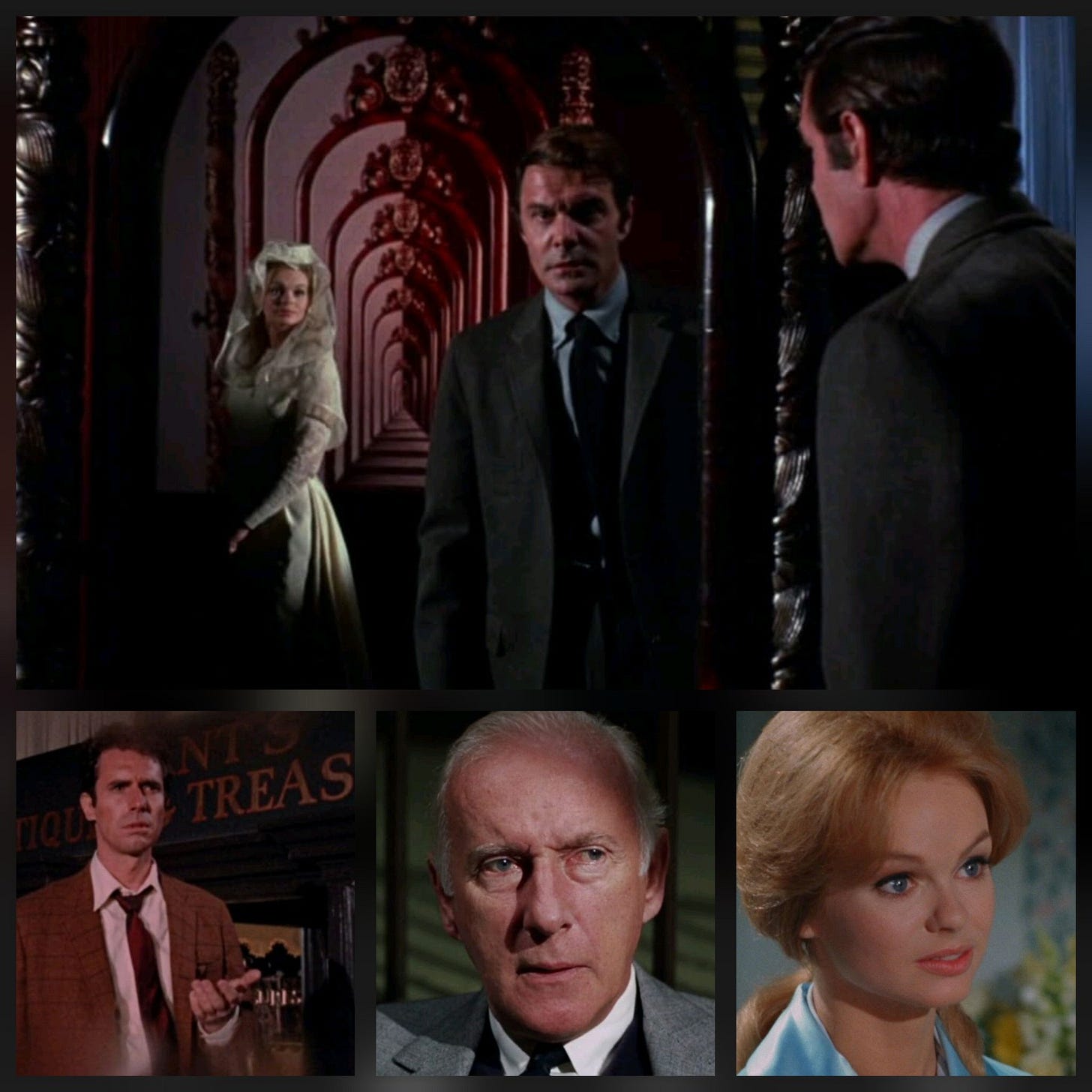Fear No Evil (1969)
An appreciation of the film by Paul Wendkos
I love occult cinema of the 1960s and 1970s!
This chiller, a Universal TV movie directed by Paul Wendkos, stars Louis Jourdan as the cool, suave, handsome, unflappably rational psychiatrist Dr. David Sorell, doctor to the bedevilled; and Bradford Dillman and Lynda Day George as Paul Varney and Barbara Anholt, the engaged couple who become bedevilled by an antique mirror.
Wendkos, known for such disconcerting occult fare as The Mephisto Waltz and Brotherhood of the Bell, directs rich use of disorienting angles and movement in the camera, as is his style. The result is something that is attention-grabbing, intoxicating, and highly communicative.
I particularly admire the way Wendkos communicates occultism and Varney’s poisoned being without a word of verbal explication in the opening sequence.
This is cinema, after all, and he goes on to use Wellesian upward angles to communicate commanding characters as well as fascinating use of rich colours, light, and shadow across faces.
Fear No Evil is a stylish piece of feature-length television that is visually sumptuous and innovative, even if it is not a slam-dunk effective story. It clearly follows in the wake of contemporary occult success, Rosemary’s Baby.
One interesting angle — pun intended — is on the mirror as both reflector and projector; doorway; and of medium no just for seeing but seemingly as watcher by itself. The idea that the mirror is much watching as reflecting, is subtly codified in the composition of the shots, and adds to the disturbing atmosphere.
The film naturally invites comparison with the Kolchack TV movies and subsequent series, in that both are Universal properties from nearby years and both deal with an investigator in contemporary times who gets caught up demons and things that go bump in the night.
Fear No Evil was, of course, conceived as a pilot to a TV show, just like Kolchak, and whilst I love the latter as a charming rough diamond and flawed but interesting show, it did ultimately fail due to the limitations of the format. Fear No Evil, with the natural chemistry of hero, Sorell, and his elderly mentor in the occult, Harry Snowden (Wilfred Hyde-White), had the potential to do better.
As a story, it speaks to a common theme in occult cinema: desire for secret knowledge, advantage, and a corruptive over-reach for it. It also speaks to trust, betrayal, paranoia, and the kind of modern satanic socities as we saw in Val Lewton’s The Seventh Victim and the aforementioned Rosemary’s Baby.
The visual effects are a delight considering this is a 1969 production, although the film is strangely let down by distractingly obvious back projection.
One aspect of Fear No Evil that I liked very much is Billy Goldenberg's score. It predates Jerry Goldsmith's especially effective The Mephisto Waltz score, but is evocative of it. I would very much like to be able to get this score on disc, if the pure music recording still exists.
I watched the restoration of the gorgeous 35mm print as issued on Blu-Ray disc by Kino-Lober, which contains a studious and informative viewer’s guide commentary track by Gary Gerani.
Who's seen it? What do you think?
In the collage, clockwise from top left:
One of the film’s successful effects, a Sorell looks into the bedevilled infinity mirror and sees Barbara Anholt (Lynda Day George) on the other side.
Paul Varney (Dillman) in the celebrated opening sequence.
Harry Snowden (Hyde-Wight) as the interesting mentor to Sorell.
Barbara Anholt (Lynda Day George) in her wholesome codification.



Great film! Still holds up!